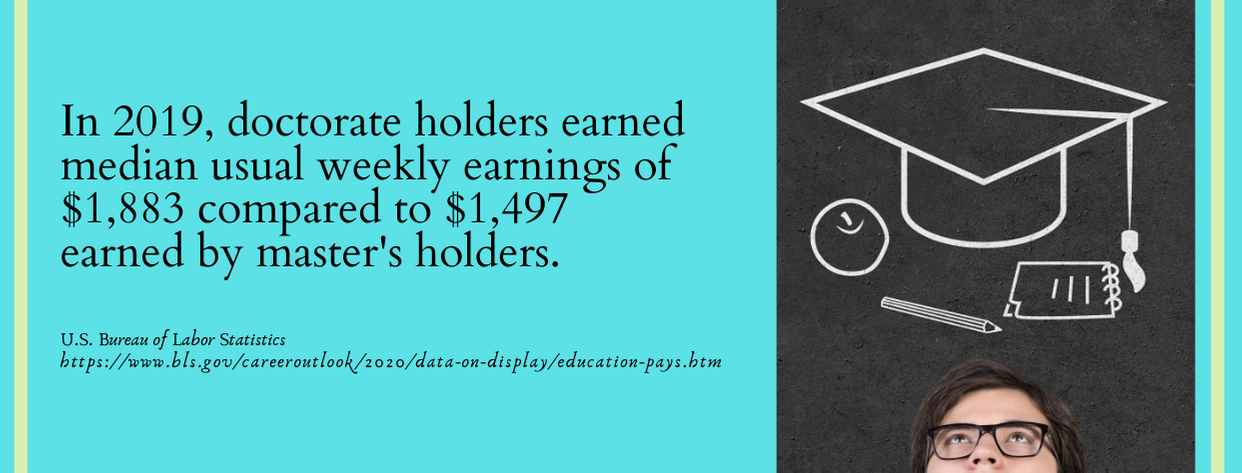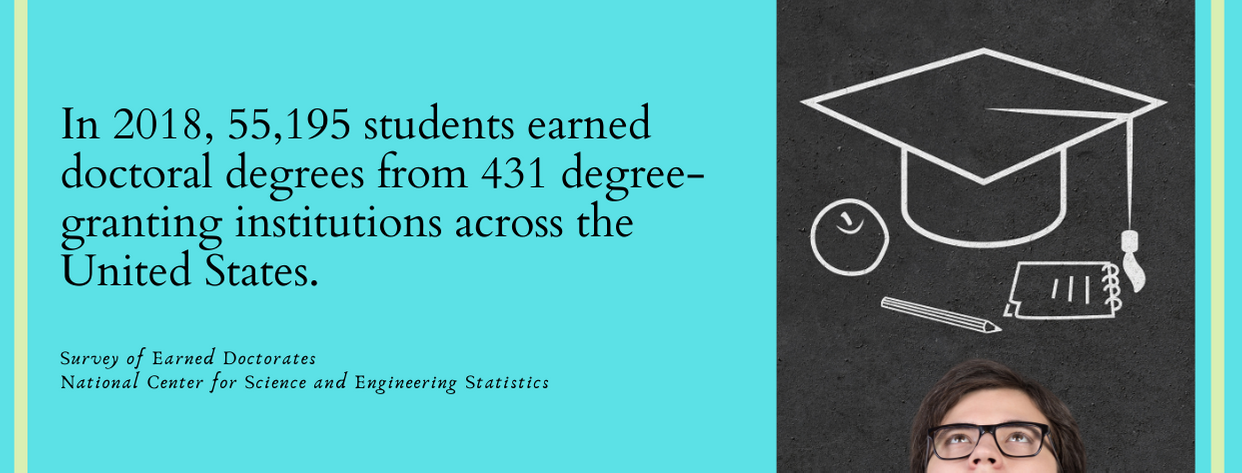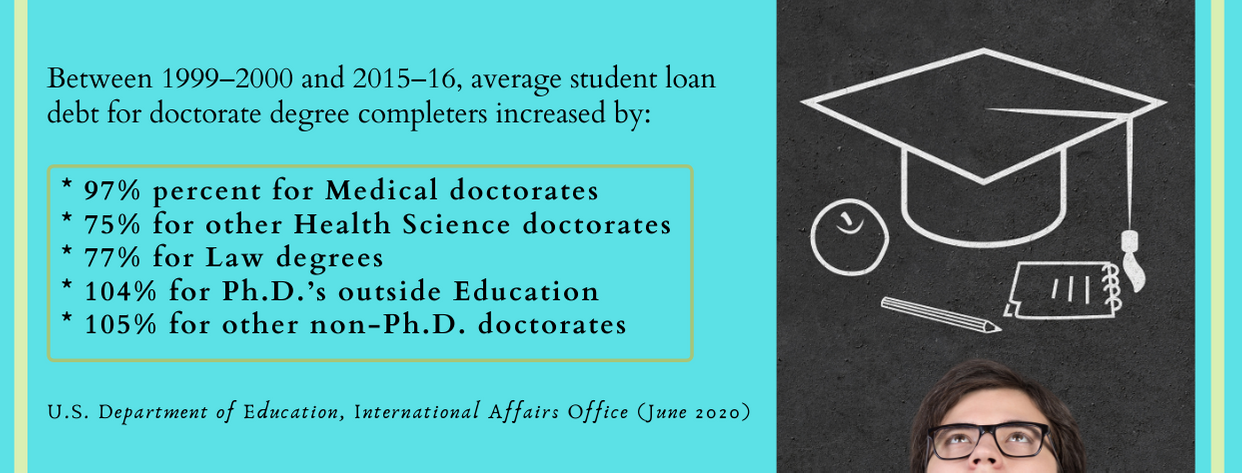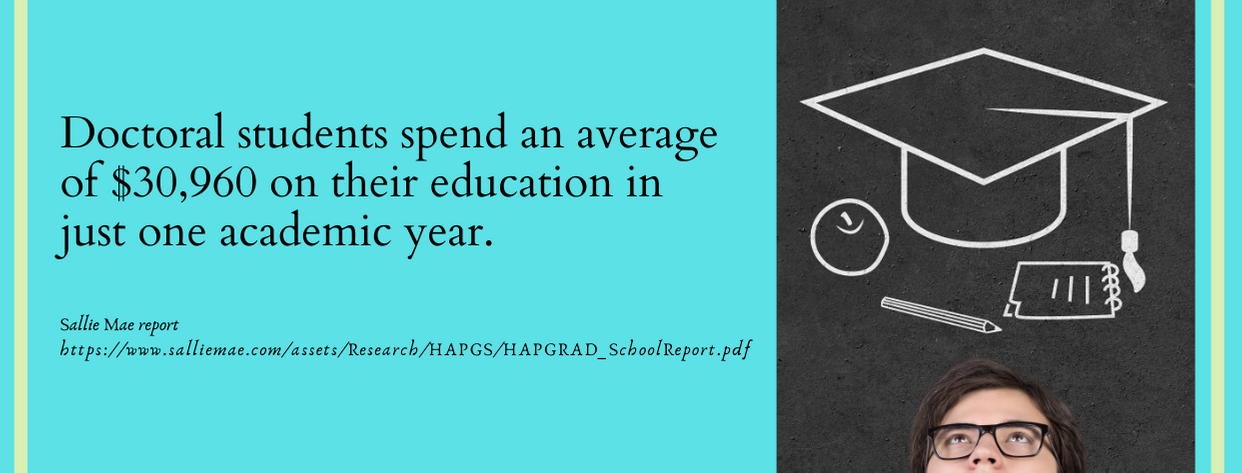In 2012, sports legend Shaquille O’Neal earned his doctorate in education (Ed.D.) from Barry University, Florida. More than the NBA championships, Dr. O’Neal considers his advanced degree as his sweetest and “most important” accomplishment. It took him two decades of juggling a demanding athletic career, a growing family, various business ventures with school stoppages along the way to earn a doctorate in his 40s finally.

His doctorate was not honorary, unlike Kanye West’s. So, how did he do it then? How was he able to make time for an equally demanding doctoral track – which took him about four years to complete – despite his loaded schedule? The answer was through online education. He also earned his master’s degree from the University of Phoenix’s online graduate program.
Graduate programs have always been at the forefront of online education or distance learning. The earliest beginnings of online education at the graduate degree level can be traced back to the 1980s with institutions like the Nova Southeastern University in Florida and the University of Phoenix offering accredited graduate degrees. Fast forward to 40 years with data from the National Center for Education Statistics (NCES) showing that in 2018, there are more than 1.2 million graduate students enrolled in an online course, whether exclusively or only in some courses. The majority of those graduate-level students are on a master’s degree track, which accounts for roughly 85% of the 2018 statistic, while the rest are doctorate students who are either on a Ph.D., Ed.D., MD, DDS, or JD tracks.
Indeed, in the highest echelon of institutional learning, there are fewer enrollees. But despite this, the number of doctorate students, especially those enrolled in online programs, are steadily rising through the years. This then raises the question: If American education is so expensive, why are there still some who choose to pursue a very rigorous doctorate despite the cost, time, and all the other odds? Simply put, what do you get out of a doctorate?
Once you read through the information below, scroll back up here to see our “best doctorate/phd” series of rankings for degree specific PhDs available online!

Navigate through the links below to fully understand the motivation behind doctorate studies and the role online education plays at this level of higher learning.
The Doctoral Degree: The ‘What,’ ‘Why’ and Everything Else in Between
What are the Career Prospects for Doctorate Holders?
Online Learning in Higher Learning: Navigating through Your Doctorate Virtually
The Cost of Being a “Doctor”
Is an Online Doctorate Really for You?
The Doctoral Degree: The What, Why, and Everything Else in Between
What is a doctorate?
If you regularly watch the highly-rated sitcom “The Big Bang Theory,” you might have heard the lead character, Dr. Sheldon Cooper, in one of the episodes introduced himself along with his many academic titles to start a scientific conference:
“I am Dr. Sheldon Cooper, BS, MS, M.A., Ph.D., and Sc.D. O.M.G., right?”
His last two titles (not including the “OMG”) are among the many titles conferred at the doctorate level, with the Ph.D. title, or Doctor of Philosophy, is the most recognized of all, and also the most inaccurately used to describe the entire doctorate level. Sheldon’s Sc.D. title, which stands for Doctor of Science, is another example of a doctorate, although, in other countries like the UK, an Sc.D. is considered to be a step higher than a Ph.D., thus, a post-doctorate.
The word “doctorate” comes from the Latin term “docere,” which translates to “to teach.” The word “doctor” means “teacher” in Latin. So, the common notion that most academics who decide to pursue a doctorate is to teach at a university and be called a “professor” is true, albeit, simply put. These days, depending on which source you’re referring to, you might be confused when you encounter the terms research doctorates and professional or practical doctorates. The distinction (and confusion) stems from the title conferred to both, even though each track has a different set of graduation requirements, core competencies, and even admission requirements.
Also adding to the confusion is the fact that the NCES combines these two doctorate types when releasing its annual Digest of Education Statistics. It defines “Doctor’s degrees” as the next degree after “Master’s degrees,” and if you scroll to the report’s footnotes, you’ll see this elaboration:
Includes Ph.D., Ed.D., and comparable degrees at the doctoral level, as well as such degrees as MD, DDS, and law degrees that were classified as first-professional degrees before 2010-11.

Let’s dig a little deeper:
In the United States, the doctorate is the next step of educational attainment after a master’s degree. The NCES divides the degree into three types: research, professional, and “other,” with the definition of that last type being an arbitrary, institutional decision. For practicality and simplicity, only research and professional doctorates will be defined and explained in this piece.
There are two well-defined types of doctorates in the country: a research doctorate and a professional or practice doctorate. The former, as the name implies, is more research-focused and requires a master’s degree for admission and a dissertation for graduation. The latter, as the name implies, is more practice-focused, whether clinically or non-clinically. It only requires an undergraduate degree for admission. A demonstration of practical expertise, application of evidence-based principles and techniques, and a prescribed number of clinical hours (or its non-clinical equivalent) are the minimum requirements to earn a professional doctoral degree.
The Rutgers School of Health Professions published a document that better delineates the differences between research doctorates and professional or practice doctorates. The rubric was crafted with documental guidance from the Council of Graduate Schools (CGS) and the Association of Schools Advancing Health Professions (ASAHP).
RESEARCH DOCTORATE
In the Rutgers guide, all research doctorates are classified as Ph.Ds. Nevertheless, the curricula of research doctorate programs are focused on, well, yes, research. More than half of the curriculum is based on the whole concept of research – how to write it and defend it. This includes the structure, the hypothesis, design, data gathering methods, statistical principles and applications, and presentation of evidence or findings culminating in a dissertation. This is independent research that is submitted, presented, and defended by the candidate to a panel of subject matter experts who then approves or signs the dissertation to be published in peer-reviewed journals. A doctoral candidacy examination is also required.
Aside from the ever-popular Doctor of Philosophy (Ph.D.) degree, other examples of research doctorate degrees conferred by universities are:
- Doctor of Arts (DA)
- Doctor of Education (Ed.D., like Shaq’s)
- Doctor of Science (Sc.D., like Sheldon Cooper’s)
- Doctor of Theology (Th.D.) and many more
Disclaimer: The terms “research doctorate degrees” and “PhDs” will be used synonymously in this piece for colloquialism purposes. As mentioned, a Ph.D. is only a subset of research doctorate degrees.
PROFESSIONAL OR PRACTICE DOCTORATE
Unlike research doctorates, the curricula of professional doctorates are more focused on the application of evidence-based practices and principles. A dissertation or independent research is not required for completion (not usually). Instead, the expected outcome is the demonstration of clinical or practical work expertise in a specific field. To further distinguish this from research doctorates, a master’s degree is not required for admission into a professional doctorate program. An undergraduate degree, whether a two-year or a four-year program, is the requirement instead. Thus, the minimum time required for completion is six academic years (the sum of a minimum of 2 years of undergraduate work and a minimum of 4 years of professional doctorate study).
While the Rutgers guide and everywhere else on the web (Berkeley, Wikipedia) uses the term professional doctorate, the US Department of Education (USDE) and the NCES use the term doctor’s degree-professional practice. However, from the academic year 2011 and earlier, these agencies previously used the term “first-professional degrees” to refer to professional doctorates, as these are essentially entry-level qualifications for highly specific roles.
Most professional doctorates fall under the health-clinical umbrella such as, but not limited to:
- Medicine (MD)
- Dentistry (DDS or DDM)
- Podiatry (DPM)
- Physical therapy (DPT)
- Behavioral Health (DBH)
- Pharmacy (Pharm. D.)
- Clinical Laboratory Science (DCLS)
But there are also non-health professional doctoral degrees such as, but not limited to:
- Computer Science (D.C.Sc.)
- Law (JD or Juris Doctor)
- Management (DM)
A doctorate in Psychology can either be a research doctorate (Ph.D.) or a professional doctorate (Psy.D.). The latter allows its conferees (after passing the state licensure exam) to see and treat patients.
Research study is also part of the curriculum but is limited to the critique and application of reviewed and established research literature of a specific subject matter.
So, to sum this section up, a doctorate is the highest conferred academic degree in the United States. It typically leads to top-level careers in the academia and the field of research.
So, why do some choose to continue their education to earn a doctorate?
The roles that we mentioned – professorship, research, clinical, jurisprudence, etc. – all require a doctorate. Having a doctorate is not always like a master’s degree, where having it gives you a great advantage in terms of job prospects over undergraduate candidates. Earning a doctorate, while it is the highest educational attainment, is merely a requirement to hold certain authoritative positions in the education, health, non-profit, and government sectors (it’s a different landscape in the private business sector, but we’ll get to that later).
In the Bureau of Labor Statistics’ (BLS) 2018 Career Outlook Report, it is found that of the 101 graduate-level occupations surveyed, 63 of these roles require a doctorate. Because at the heart of doctorate degrees is the expected outcome that its graduates become trailblazers, innovators, and significant contributors in their respective fields. They are expected to be leaders and specific subject matter experts that laypeople seek authoritative and credible insight. The BLS projects that varying sectors will need more doctorate graduates to fill several specific positions in the coming years.
What are the Career Prospects for Doctorate Holders?
The simplest answer here is it depends on which doctoral track you choose.
If you decide to pursue a professional or doctorate to become a practicing lawyer, a doctor, a dentist, or other roles in the medical field, your career prospects are promising both in terms of demand and salary. CNBC and job portal Indeed released two reports, seven months apart, ranking the highest paid jobs for 2020. Medical and dental specialty professions like anesthesiologists, surgeons, orthodontists, general dentists, psychiatrists, physicians, and obstetricians have consistently emerge on top of the rankings, with median annual salaries ranging from $170,000 to a whopping $350,000.
As for those who enter the foray of research doctorates, most of them are in it for the learning and intellectual growth, or as the Princeton Review puts it, “learning for learning’s sake.” But if you ask ten doctorate students on what their career aspirations are, chances are, more than half of those you asked would say that they aspire to be a tenured professor in the future. This linear and conventional assumption of doctorate graduates’ job prospects is supported by a 2019 Ph.D. survey conducted by Nature Research. As it turns out, after surveying Ph.D. students around the world, 56% of its respondents echo the academic route postdoc. Industry or corporate roles come in as the next best option, with 28% of the respondents opting for that path.
It will be best for research doctorates to broaden their horizons and venture beyond the life of teaching combined with research. In the National Science Foundation’s (NSF) 2018 Survey of Earned Doctorates, there is a significant drop in employment in the academic sector between 2013 and 2018, from a 50.2% employment in 2013 to 43.2% employment in 2018. This is not attributed to the weakening demand for the sector. We now know that many doctoral candidates still aspire to the stability that an academic tenure brings, but right there in that data is the paradox that explains the statistical decline. Having more tenured professors means fewer open positions for new aspirants. The imbalance stems from the fact that there is a disproportionate number of doctorate graduates compared to open professorship positions – 36,000 graduates, most of whom dream of the academe, versus the 3,000 tenure-track positions filled in 2011, and that trend continues today.
If a job in the academe seems bleak and grim, what then? The industry, government, and even the non-profit sectors are becoming pragmatic employment options for research doctorate graduates. According to data released by the NSF Survey of Earned Doctorates, employment rates in the said sectors have seen a gradual and steady rise from 2013 to 2018. The combined employment rate between the industry/business, non-profit, government, and other non-academic sectors is greater than the employment rate in the academic sector alone. This is an indicator of growing diversity in job prospects for research doctorate graduates.
In 2014, an Urban Institute published paper reports that the fields with the best job prospects for research doctorate graduates are in the STEM and life sciences fields:
- Engineering, at 85%
- Physical Sciences, at 71%
- Life Sciences, at 53%
Non-STEM fields like the social sciences are also looking at a decent employability rate outside academia at 40%. Meanwhile, the Humanities fields have a 17% employability. The 2018 Survey of Earned Doctorates revealed that doctorate holders in the fields of STEM, life sciences, social sciences, and even education had enjoyed better job opportunities in the business, non-profit, and other non-academic sectors. Aside from these observations, there are two other noteworthy pieces of data from the NSF Survey:
- From 2013 to 2018, Ph.D. jobs in various areas of the government sector and the academe have seen a steady decline.
- There is a remarkable job growth potential for those with Humanities Ph.D.s in the private sector, particularly in the business sector.
“A history major who has studied the Enlightment (sic) or the rise and fall of the Roman Empire may be more likely to understand the human elements of technology and how ease of use and design can be the difference between an interesting historical footnote and a world-changing technology. A psychologist is more likely to know how to motivate people or to understand what users want.”
Vivek Wadhwa
“Why Silicon Valley Needs Humanities PhDs”
Washington Post, May 17, 2012
The reason for the rise in humanities PhDs in a seemingly ironic industry such as tech, consumer electronics, and the private business sector as a whole is not ironic at all. Engineers and developers have “hard skill” expertise in coding, debugging, cloud skills, web services, developing, UX skills. In contrast, psychologists, historians, and other humanities graduates have the essential “soft skills” to complement the hard skills, such as people engagement, market insight, communications, critical thinking, and persuasion.
Notably, people management is now considered a “hard skill.” After all, what’s the use of a smart car, phone, TV, or smart “anything” if you can’t market it to everyday consumers? Scenarios like this are the reason many tech companies like Box and Facebook have realized the value of liberal arts PhDs, thus the observed employment growth in that field.
So, to close this section, the idea that the only career outcome for research doctorates is to teach at a university is ill-informed, at best. The numbers show that there is a future for doctorates in the non-academic sector, particularly in the business sector. Even humanities or liberal arts PhDs will thrive at any kind of enterprise, whether it’s financial, tech, pharmaceutical, or a combination of these (e.g., fintech, biotech). Still, of course, a little tech know-how in, for example, data science or health informatics, is an advantage. A quick search at job portals like LinkedIn should give you an idea of where to land after you earn your research doctorate, and to be honest, it’s still an optimistic outlook despite the current pandemic and recession.
Online Learning in Higher Learning: Navigating through Your Doctorate Virtually

Graduate-level studies are typically the primary formal offerings of online schools. The demographic of graduate students who are mostly multi-tasking adults with jobs, families, and graduate school work on their plates presents the perfect use case of online learning or distance education. It meets the flexibility requirement that grad students need to balance their different responsibilities. The asynchronous lectures allow students to repeat what the professor said without disrupting class. The cost effectivity of learning online is also a plus.
There are, of course, disadvantages as well. Aside from the usual downsides like the absence of social interaction and the non-instantaneous feedback, the absence of a physical interaction with your adviser that is of paramount importance during your dissertation might delay your doctorate completion. In these days of social distancing, video chats and emails will have to do until such time when physical interaction is no longer a health hazard.
For professional doctorates, especially medicine-related fields, a purely online form of education is still not quite possible because the nature of the discipline is patient-based and will always require practical training. But that doesn’t mean that the field is not making strides. Top-tier medical universities like Harvard, Stanford, and John Hopkins, as well as MOOC websites like Coursera and edX, have started offering medical lectures. These lectures include pre-clinical level topics like Anatomy, Biochemistry, and Immunology, and continuing education topics, such as COVID-19 Training for Health Workers, Health Informatics, Cancer Immunotherapy.
There is a growing demand for change in the delivery of instructional materials in the field of medicine. The demand stems not only from the need to adopt online education across all levels of learning but also from a rising trend in competency-based learning, from which the field of medicine can greatly benefit. Time-based learning is one of the cornerstones of the MD curriculum. It’s one of, if not the longest, curricula in all of higher learning because of the traditional rule that each sub-specialty or sub-discipline (e.g., neurology, surgery, cardiology, etc.) must be taught within a specific time-frame, which usually lasts a term or two. With competency-based learning, students take the courses whenever their time permits them to do so, and not when it’s available for that term. Grad students also complete the courses at their own pace. They can choose to take as much time as they need or finish the program in an accelerated fashion.
The best medical schools that strive to meet the demands of the changing educational landscape use the blended learning modality, as it will be hard to eliminate the need for face-to-face instruction. Until social distancing measures are eased, face-to-face instructions will be restricted to laboratory and case simulation exercises and require minimal student attendance at a time.
As for Juris Doctor degrees or law doctorates, online learning has been a widely adopted mode of education in the field—especially now with the pandemic. While it is widely adopted, it is not widely accredited. The American Bar Association (ABA) has always been adamant about accrediting law schools with online offerings. The reason for this is the discipline is founded on the Socratic method of dialogical exchange, and translating this fundamental law school exercise into the online space has posed certain challenges, thus the ABA’s apprehension for the accreditation.
But again, with social restrictions in place, hybrid programs have gradually gained credence and the accreditation – or waiver – of the ABA. These hybrid programs are of similar structure to that of medical curricula – only those subjects that are required to be taken on-campus will be structured and offered as such, lectures and other written coursework can be taken online. Among these re-designed JD programs that have been accredited by the ABA are that of Syracuse University and Loyola University – Chicago.
Future law doctorate students must check the ABA database to confirm that their law school’s hybrid JD program is accredited or has received an ABA waiver.

Most online doctorate programs are research doctorates as the structure of its curricula can be easily implemented online. But contrary to popular notion, embarking on an online doctorate program is not a purely online endeavor. Campus visits may still be necessary. But because of the current pandemic and social restrictions, even adviser consultations and the dissertation defense is being held online.
With all these nuances from program to program, what can one expect from an online doctorate? What tools are needed? Are there any special skills needed to navigate such a learning modality? And since we’ve established that some campus appearance might still be necessary, how often does one need to come to campus? Also, is it always true that online degrees cost less than traditional degrees?
Let’s dissect each of these to help you prepare for your doctorate studies online.
Completion Time
The time to complete a doctorate as a resident and as an online student is pretty much the same. Different sources report different averages. CBS News reports that the average time of completion for most on-campus research doctorates is 8.2 years. The 2017 Survey of Earned Doctorates reports that the average completion time is 5.8 years. US News plots the average completion time specific for online doctoral programs at a minimum of 3 years, which is the accelerated online version of its traditional counterparts. Three years is long by online education standards but short by doctorate level standards. And this is not a question of whether to earn it on-campus or online; your only option at this time is to take your classes online. That’s a three-year commitment right there, at least! You’ll have to juggle a maturing personal life and work. You will need to stay employed to finance your doctoral studies as well.
Are you ready to commit at least three years of your life to studying, researching, building your dissertation, attending online symposia, and connecting with your peers and adviser or supervisor while living a life outside grad school? We emphasize the words “at least three years” to help manage your expectations.
Two things might help speed up your completion:
1. Ask your graduate school about an accelerated or fast-track online curriculum, if any.
Doctorate degrees in Nursing Practice (DNP), Physical Therapy (DPT), and Occupational Therapy (DOT) are some of the life sciences tracks that offer accelerated programs on two-year curricula that can be completely taken online. In the STEM discipline, a doctorate in Biomedical Engineering can be completed in at least two years as well. An Ed.D. or Doctorate in Education can also be completed within 2 to 3 years.
Various institutions across the country offer these accelerated online doctorates.
Now, remember the caveat for accelerated programs: the courses are compressed to shorten the completion time, which means you’ll have to be more committed, studious, and diligent in meeting coursework requirements and deadlines.
2. Ask your school (or prospective school) if the curriculum is competency-based instead of time-based.
As discussed in the previous sections, the advantage of a competency-based curriculum or coursework is that the essential requirement to pass is to demonstrate mastery of the subject through a calibrated assessment. Competency-based curricula are also available to be taken anytime. So, students don’t need to rely on the course or faculty availability as they would normally have in the traditional setting, thus, setting students up for an accelerated track to completion.
We can’t stress this enough. The operative words in this section are “at least.” The projected completion time, especially for accelerated degrees, are based on prescribed (or ideal) course lengths. While completing a two or three-year doctorate program is possible, it is a rarity. Other extenuating factors affect one’s completion and expectations of an online doctorate program, which we’ll discuss next.
Flexibility
Flexibility is not just the concept of taking online classes “anytime, anywhere.” Online classes can either be live (synchronous) or “taped” (also known in today’s jargon as self-paced or asynchronous). If you are joining a live online lecture, you can easily garner feedback from the professor and from your classmates who are also in the call. However, if you have a spotty connection, those feedbacks may not be instantaneous at all. You may be better off with a self-paced lecture wherein you can hit rewind or fast forward to those parts of the lecture that need or don’t need a replay. Feedbacks are still being given, but it might be through email or messaging apps, so you’d probably get the response either in real-time or in a few days.
You’ll be exposed to a lot of frequently used online learning tools like Zoom for videoconferencing and various messaging apps, which should (temporarily) take the place of physical conversations with classmates, professors, advisors, and even school staff. Cloud storage services including OneDrive and Google Drive will become your locker and notebook binder rolled into one.
Most grad schools maintain their own Learning Management System while some use Google Classroom, Blackboard, or Canvas. If you’re new to online learning for the 21st century, or have done it before but with CDs and the like, you must learn how to multi-task and quickly navigate from one app to the next. The “alt+tab” (PC) and “command+tab” (Mac) keyboard shortcuts will be your best friend.
The numerous online and easily accessible tools can cut down the time spent on campus doing tangential activities. You’ll no longer need to park your vehicle, commute from home, walk from one class to the next, visit the library for research, submit reports to your adviser, or hit the cafeteria for breaks. Having all these tools in one ecosystem—your laptop or desktop—saves you time and allows you to attend to other priorities like work or family life.
This type of doctorate learning set-up also allows you to take elective classes. If, for example, you are a liberal arts doctorate student, it is to your advantage to enroll in tech-related electives, such as coding boot camp on Python or a lecture on Blockchain. These electives, along with your doctorate, will give you far better chances of landing a great role at a great company, or the flexibility to be employed across sectors. Now, that’s flexibility, both while studying and after.
Campus Visits
At times, even in these restrictive times, a monthly or bi-monthly appearance on campus may be necessary for various reasons. As discussed, for professional doctorates, the visits to campus will be required for exercises that cannot be implemented effectively online. For research doctorates in the liberal arts, the need to come to campus would sometimes be limited to personal discussions with program advisers. For STEM doctoral candidates, one of, if not the sole reason for on-campus visits would be for laboratory exercises, requirements, or experiments, and again, these activities are just impossible to be migrated virtually. So, manage your expectations well. Even if it says on the program info that classes can be purely taken online, check with the school or the alumni (if you know some) if some campus visits will still be required for the program. If so, plan your location and school choice wisely, especially nowadays, with select travel restrictions still in place. Choose a graduate school that is close to your home, even if you are attending it online.
Cost
It is logical to conclude that, since you’re learning online and not spending for gas, parking fees, public transportation, meals, room and board, and physical facilities, the cost of online degrees in this respect is significantly less. This is true on the surface. Counterarguments are everywhere on the internet about the not-so-hidden costs of online education. From infrastructure to the design of curricula and instructional materials, to marketing, to server, security and database maintenance and instructors’ fees, online education can cost just as much as its traditional counterparts, and doctorate degrees are no different.

For example, at the University of Massachusetts – Lowell (UML), the Doctorate of Nursing Practice (DNP) degree is offered both as an on-campus and online program. If the tuition rates – and only the tuition rates – are stacked against each other, the online offering costs almost $4,000 more than its in-state on-campus counterpart:
UML’s Doctorate of Nursing Practice (DNP):
Online: $575/credit hour, and based on curriculum information on its site, the program requires 33 credits spread across 11 courses. Thus, $575 x 33 credits = $18,975
In-state, on-campus: total tuition = $15,210
Of course, the out-of-state tuition, which is $26,990, will set you back almost $8,000 versus the online offering. Still, if you can avail of the regional interstate discount, which is the New England Regional Program for UML students, this can bring down your tuition to $23,021, which is still expensive compared to the online program.
Schools charge differently for their online offerings for different reasons. Many of those who were at the forefront of the online learning industry early on are still paying for their initial losses back when online education wasn’t as mainstream as it is now.
Expect some disparity and erratic trends among online schools and their tuition fees. Manage your expectations on tuition and other costs. Not all schools will charge less for their online offerings versus their traditional offerings. Some will charge just as much, while some will charge even more! Our other advice: do the math. Check the breakdown of information for each fee. Many online offerings will charge you for a “distance education” or an “online learning” fee, and this is not unusual. Look for other charges and add them all up. As traditional or residential learning is being put on hold for now by many institutions due to the pandemic, the only educational avenue you have is online learning. So, stretch that dollar, make it count, and don’t fall victim to exorbitant fees and hidden charges that dodgy schools might take advantage of simply because online learning is now mainstream and the only option.
Our last advice: you can still have options – school options and financing options. Besides, when it comes to getting your doctorate, prospective employers, especially in the non-academic industries, don’t bother whether your school’s an Ivy, elite or not. Your research, your collaborators, your network are much more valuable than your graduate school, at least at the doctorate level. Stretch your hard-earned dollars by applying in a doctoral program that presents an ideal balance of quality faculty and research, value for money, good logistics, promising career outcomes, and proper accreditation by both the CHEA and the USDE.
The Cost of Being a “Doctor”
We mentioned in the last section to have options, and not just school options but financial options. But these two concepts are tied together.
You see, at the doctorate level, there’s such a thing called funding. This is not distinct to doctorate degrees. All other levels of higher learning have some form of funding, whether in the form of scholarships, grants, fellowships, or aids. Of course, loans are always available at every level of education. But at the doctorate level, funding also comes from various organizations that willingly provide subsidies or sponsorships, sometimes in the form of fellowships, for dissertations and other researches that could be instrumental to the development and advancement of a particular field or discipline.

Indeed, one of the factors you should also strongly consider in choosing a doctorate program, whether on-campus or online doctorate, is funding. Lack of funding can have a rippling effect on your doctoral track that would crossover on to your personal life. How?
Lack of funding is one of the biting realities a doctoral candidate can experience. A Nature Research piece entitled “PhDs: The Tortuous Truth” examines this unfortunate reality, along with other struggles that many doctoral candidates face in their pursuit of being a “doctor.” Those who are admitted to non-funded programs are forced to find employment. If you’re lucky, you can work within the academe as a research assistant or a teaching assistant. The word “lucky” here is disputable, as it has always been established that graduate assistants are the “cheap labor” that build the backbone of academic research.
Others have to settle with other non-related jobs such as waiting tables or online ghostwriting just to make ends meet, and sometimes, whatever they earn may still not be enough. Even graduate assistants are underpaid, as they usually earn only less than a quarter of what a full-time professor is earning in one academic year. If, by any chance, whatever their earning seems enough, to what expense would that be? Is it at the expense of a work-life imbalance? The absence of social life? The persistence of stress about debt and bleak job prospects, and for some, deportation?
This is why we strongly advise looking for doctorate programs that are fully funded. With the intense coursework requirements of a doctorate (remember, it takes at least three years to complete it), not worrying about funding could spell the difference between a timely completion and a delay. But the delay in completion is a problem for both non-funded and funded programs. For those enrolled in non-funded programs, the delay could stem from student difficulties, whether financially or in time management, or both, as the stresses of balancing school and work may be overwhelming. On the other hand, candidates in fully funded programs are also worried about delays in completion, thanks to the coronavirus’ large-scale interruption of activities across all sectors. They are currently facing uncertainties whether their funding will be (hopefully) extended or implemented as is, which is bad news as this will result in the funding expiring sooner, leading to delay in completion.
However long this pandemic goes, your best bet would still be to apply to a fully-funded program. At least, with your funding covered, you got one less thing to worry about. Information about a specific program’s funding can be usually found alongside the program information. If the institution has a dedicated site for its graduate school, the information would usually be right at the home page or somewhere else that’s easily visible, as it helps attract program applicants.

If you are on the other end of the funding spectrum, here are ways to self-fund your doctorate:
1. First of all, if it seems like your prospective program is not funded or is only partially funded at the school of your choice, it pays well to plan, like, way in advance. If you are applying for scholarships, your preparation should’ve started back when you were completing your master’s degree. Keep your Free Application for Federal Student Aid or FAFSA form up-to-date with your latest personal information, and make readily available for submission within the deadline.
2. Being employed by a large firm or multinational companies is also a good gateway for subsidized admission to a doctorate program. Similar to master’s degrees, many companies are keen to subsidize the continuing education of its employees, especially those that have demonstrated valuable potential. In exchange for the subsidy, you might need to commit to the company for a prescribed number of years or maintain a certain grade, but overall, this is a good deal, especially for online doctorates. The tuition assistance that companies distribute to eligible employees ranges from $2,000 to $10,000 a year. For those admitted to online doctorate programs, this is a substantial subsidy (“better than nothing,” as some would say). Some companies shoulder their employees’ entire tuition while others disburse the assistance on a per-class basis, which is also equally substantial.
3. The Federal Work-Study program is, in essence, similar to the tuition assistance provided by private firms – you work to stay enrolled. The difference is “study” comes first before “work,” which is the other way around for the preceding item. Your school (granted it participates in the program) will connect you to on-campus jobs to help with your education. Other roles outside the institution are also available, and your school will connect you with the participating organizations. The nature of your role is either related to your field of study or related to civic work.
4. Internships and fellowships are also a viable way of funding your degree. With internships, you can get better leverage if you demonstrate your long-term value to the company or organization. As for fellowships, it’s important to have your scholastic and extracurricular credentials mirror your potential. If you have done any research proposals or projects that are relevant to the organization or institution offering the fellowship, those could also increase your chances of being accepted. The same goes for interns asking for educational sponsorships from their employers. You can “sell” your ideas or proposals to your employer or the company in exchange for your schooling and, in most cases, an employment bond.
5. Grants are also a great way of pooling funds for your doctorate. The government, a private firm, or a non-profit fund your research in exchange for, well, nothing, it seems. At the doctorate level, though, only candidates in education or teaching-related degree, such as Ed.D. degrees, are eligible for a federal grant, the Teacher Education Assistance for College and Higher Education (TEACH) Grant. If you’re not pursuing an Ed.D, fret not. Several other philanthropic organizations are known to award grants to research projects in various fields of study. You can browse through the list here.
Regional interstate agreements between regional compacts can help reduce, not fund, your tuition. There are four regional compacts, each of which is comprised of several neighboring states that are in proximity with each other or share a land border with one or several states:
- Western Interstate Commission on Higher Education (WICHE) – comprised of 14 western states plus Alaska, Hawaii, Guam, and the Marshall Islands
- Southern Regional Education Board (SREB) – comprised of 16 southern states
- Midwestern Higher Education Compact (MHEC) – comprised of 11 states in the Midwest, and
- New England Board of Higher Education (NEBHE) – comprised of 6 northeastern states
Each compact represents an interstate agreement to provide tuition subsidies to students residing within the region but is enrolling outside state lines, resulting to lower than out-of-state tuition fees for non-residents.
6. Another effective way to keep your costs down is to enroll at a public institution. Make sure, however, that the graduate program and the graduate school are both properly accredited.
7. And of course, as mentioned, loans, whether federal or private, are always at the disposal of any doctoral student. Still, we saved this option for last because we would like you to consider better financial options that would help you avoid student debt, if not reducing it. Because for many new doctoral candidates, they’ll be coming into this final academic threshold with outstanding debt from their master’s degree and undergraduate studies. So, we’d like to help you find other ways to fund this last educational hurrah without getting sucked in by debt (or more debt).

Is an Online Doctorate Really for You?
You might have had your heart and head fully set to pursue an online doctorate when you started reading this piece. Now that you’ve reached the end, do you still feel the same way?
The most significant points for considering a doctorate are motivation, career outcome or prospects, and funding. In our opinion, however, a doctorate—whether taken online or on-campus—revolves around one central question:
“Do you need it?”
The word “need” is the operative word here, but we placed an extra emphasis on the word “really.” Ask yourself this question. Is it something you need to propel your career or, for starters, to jumpstart your career? Do all the possible rewards outweigh the struggles? We’re emphasizing another word here – “possible.” Don’t get us wrong, we’re not trying to persuade you to drop your dreams of earning a doctorate, but we want you to examine your goals carefully and deeply.
A doctorate program entails a huge time commitment. You need a strong sense of self-discipline because doctorate programs have a high attrition rate. It means that about half of those who start eventually drop and leave the program. That’s how rigorous and intense this level of study is! You need self-discipline because you are the only determinant of how long it will take you to finish the program.
Doctorate curricula are not similarly structured as, say, undergraduate coursework. A doctorate program culminates with a dissertation. The irony is, while it is your final and only remaining requirement to graduate, it is also the most difficult and the most time-consuming one to complete. Just hitting the ground running with an acceptable research proposal is hard enough, let alone embarking on the research itself.
Self-discipline is of utmost importance, especially if you’ll be pursuing an online doctorate. When you’re in the comfort of your own home, with the leisure and freedom to switch from one website to another (or one distraction to another), it will be a challenge to stay attentive to the online lectures and coursework. With no classmates to physically talk to and even motivate you, it might be a challenge to stay focused. So, are you disciplined and committed enough to keep your eye on your goal?
Do you need it for career advancement? Or will micro-credentials and certificates offered by various institutions and MOOCs suffice? This question should be more resonant to those pursuing research doctorates. The motivation is quite different for those pursuing professional doctorates, as these are first-professional degrees. So, it’s like saying, “they do need to earn that MD, or DMD, or JD; otherwise, they won’t find jobs.” For research doctorates, it’s different. A Ph.D. is a Ph.D. It does not guarantee the perfect career, but it does lead you to a lucrative one.
Do you need to add another loan on top of your existing, unpaid student loan? If not, are you ready to jump through the hoops to apply for merit scholarships, grants, or fellowships? Are you ready to work and study at the same time? Are you prepared to properly set aside time for your numerous priorities?
If your answered a resounding “yes” to each of these questions, you must be motivated enough to pursue an online doctorate! Stay disciplined, determined, and diligent. Manage your expectations well, and don’t let yourself burn out no matter how long it takes to complete it. Persevere in giving attention to the other facets of your life.
Earning that “Doctor” title isn’t the end of your journey; it is simply a sweet and important culmination of all your learning efforts and experiences telling you that the best is yet to come, no matter what the statistics say.